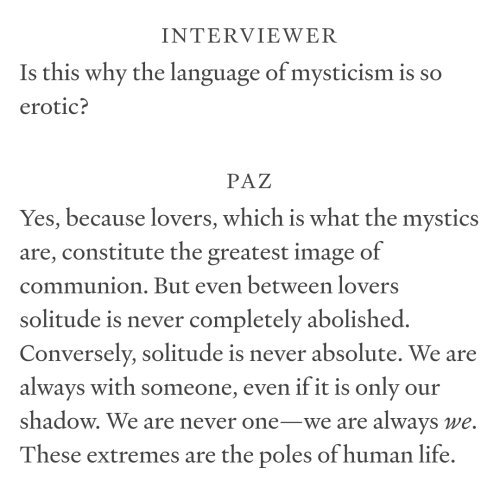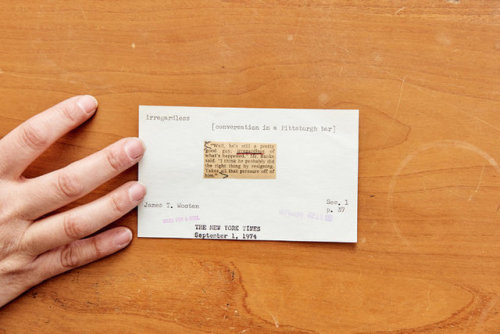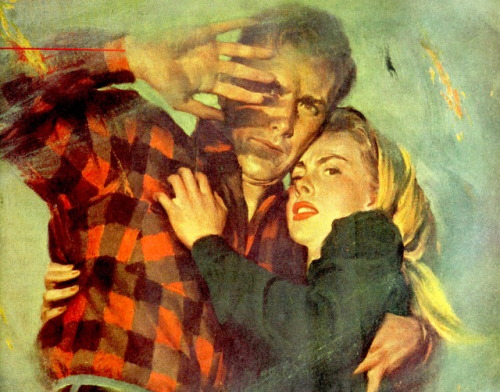#the paris review
Octavio Paz,The Art of Poetry No. 42 (interviewed by Alfred Mac Adam)
[Text ID: “INTERVIEWER: Is this why the language of mysticism is so erotic?
PAZ: Yes, because lovers, which is what the mystics are, constitute the greatest image of communion. But even between lovers solitude is never completely abolished. Conversely, solitude is never absolute. We are always with someone, even if it is only our shadow. We are never one—we are always we. These extremes are the poles of human life.”]
Post link
How about that Lenin? Big reader. Loved books. Tolstoy: loved him. Goncharov: couldn’t get enough of him. Chernyshevsky: the best. But Tariq Ali notes that Lenin couldn’t hang with the avant-garde, and that this had surprising ramifications for the Russian Revolution: “Lenin found it difficult to make any accommodations to modernism in Russia or elsewhere. The work of the artistic avant-garde—Mayakovsky and the Constructivists—was not to his taste. In vain did the poets and artists tell him that they, too, loved Pushkin and Lermontov, but that they were also revolutionaries, challenging old art forms and producing something very different and new that was more in keeping with Bolshevism and the age of revolution. He simply would not budge. They could write and paint whatever they wanted, but why should he be forced to appreciate it? … Shortages of paper during the civil war led to fierce arguments. Should they publish propaganda leaflets or a new poem by Mayakovsky? Lenin insisted on the first option. Lunacharsky was convinced that Mayakovsky’s poem would be far more effective and, on this occasion, he won.”
This and more in today’s culture roundup.
Post link
Low Tide on “The Brown Coast”
Every week, we feature a story from our archive, now available online in full to subscribers. Today, Daniel Johnson looks at a 2002 Wells Tower story, from issue no. 161.
If you ask me, there’s nothing funnier than a man seeing all that he’s created—built, grown, accrued, whatever—brought to ruin by the simple, ruthless, infuriating existence of his hapless neighbors. Such is the fate of Bob Munroe, the tragic hero in Wells Towers’s short story, “The Brown Coast.”
Post link
If shitlessness is too taboo for you, there are other ways to jar and unnerve your potential readers. Take pains to pepper your prose with irregardless, for example, and watch the hate mail pour in. Jennifer Schuessler writes, “Irregardless is one of those words that people love to hate. No one is lukewarm about irregardless. I don’t use it, but what I love about it that it has hung around on the periphery of English for over 200 years. It’s like this barnacle that you can’t get off the hull of the language, and I think that’s great.”
This and more in today’s culture roundup.
(Image: Tony Luong for The New York Times)
Post link
Looking for a fun, easy way to spice up your writing? Try throwing in a fecal intensifier or two. They’re the shit, and you’ll be thrilled shitless with the results. As the translator Brendan O’Kane writes, fecal intensifiers are the idiom of the moment, but it’s hard to follow their logic: “A certain distinguished Dutch professor emeritus … noted that ‘people before about 1950 were mostly bored shitless.’ This cracked the room up, naturally, but it also seemed slightly off …I might be scared shitless, but I’m unlikely to be amused, bored, delighted, outraged, or annoyed shitless. This is curious, since shitlessness would seem to be the natural result of something scaring, boring, or annoying the shit out of me—all distinct possibilities, according to my understanding of the idiom. In particularly unexpected circumstances, one might even shit oneself—as a response to fear, outrage, amusement, or surprise, rather than delight or (unless as a last resort) boredom.”
This and more in today’s culture roundup.
Post link
These days, it often seems the world has tilted on its axis: nothing is the same, we’ve broken with the past, there’s no going back. But we’ve still got an old friend kicking around—the barf bag. In these uncertain times, Hollywood’s horror filmmakers still turn to sick bags as a primo promotional gag. For there is still vomit in this realm, and still a need to contain it in the face of extreme spectacle. Cara Buckley writes: “After a moviegoer apparently vomited during a Los Angeles screening of the French coming-of-age cannibal flick, Raw, the theater began handing out barf bags … The move is a vintage publicity stunt going back some fifty years. Among the standout bags in movie history: The keepsake vomit bag from the 1963 splatter film Blood Feast came with an encouragement, ‘Spill your guts out!’ ‘Guaranteed to upset your stomach!’ proclaimed the bag from the 1981 Italian film Cannibal Ferox. The bag for The Beyond (1981) came with the thoughtfully worded warning, ‘Individuals with sensitive constitutions may experience stomach distress,’ and advised that the bag be used only once and not overfilled.”
This and more in today’s culture roundup.
Post link
The Etymology of “Okay”
On this day in 1839, the initials “O.K.” were first published in The Boston Morning Post.
Post link
Five Public Cases on Intelligence
Occasionally, our correspondent Anthony Madrid composes a set of quasi-koans; these are his latest.
Public Case 1: Anxieties
Our teacher said: “Anxieties about one’s intelligence are never anxieties about one’s intelligence. What’s actually at issue is whether we inspire envy in others (very acceptable), or whether we are ourselves obliged to feel envy (unacceptable). Those are the actual stakes. No one frets about whether her brain is adequate to the tasks of her life.”
Comment. An old trick. Teacher boldly admits he is mean and vain; therefore he may call you mean and vain. But how much does he really want to enlighten his students, if his method for combating vanity is to humiliate it? He says, in effect: “You are conning yourself. You pretend to worry about how smart you are, so you may seem—to yourself—to be honest and humble. You know for a fact people think you’re smart, but that’s not good enough; you want ’em to suffer…” Upshot: Everyone walks away having exempted themselves from the criticism, and firmly identifying with the authority figure. In short, meaner and vainer than ever.
Post link
While we’re swinging for the fences, here’s Lewis Lapham pondering the unfathomable immensity of the cosmos: “Isn’t that kind of the fun, the looking into the vast darkness ripe with wonders that will never cease? The limitless expanse of human ignorance … rouses out the love of learning, kindles the signal fires of the imagination. We have no other light with which to see and maybe to recognize ourselves as human … To bury the humanities in tombs of precious marble is to deny ourselves the pleasure that is the love of learning and the play of the imagination, and to cheat ourselves of the inheritance alluded to in Goethe’s observation that he who cannot draw on three thousand years is living hand to mouth. Technology is the so arranging of the world that it is the thing that thinks and the man who is reduced to the state of a thing. Machine-made consciousness, man content to serve as an obliging cog, is unable to connect the past to the present, the present to the past. The failure to do so breeds delusions of omniscience and omnipotence.”
This and more in today’s culture roundup.
(Image Credit: Autopsy of the First Crocodile, Onboard, Upper Egypt, by Ernest Benecke)
Post link
It’s not just that the concept of Western civilization is bankrupt, racist bullshit … it’s that it’s much fresher bullshit than you might think. Kwame Anthony Appiah provides an excellent primer: “European and American debates today about whether Western culture is fundamentally Christian inherit a genealogy in which Christendom is replaced by Europe and then by the idea of the West … If the notion of Christendom was an artifact of a prolonged military struggle against Muslim forces, our modern concept of Western culture largely took its present shape during the Cold War. In the chill of battle, we forged a grand narrative about Athenian democracy, the Magna Carta, Copernican revolution, and so on. Plato to Nato. Western culture was, at its core, individualistic and democratic and liberty-minded and tolerant and progressive and rational and scientific. Never mind that premodern Europe was none of these things, and that until the past century democracy was the exception in Europe—something that few stalwarts of Western thought had anything good to say about. The idea that tolerance was constitutive of something called Western culture would have surprised Edward Burnett Tylor, who, as a Quaker, had been barred from attending England’s great universities. To be blunt: if Western culture were real, we wouldn’t spend so much time talking it up.”
This and more in today’s culture roundup.
(Image Credit: The Plumb Pudding in Danger, James Gillray)
Post link
Chabon, Lethem, Eggers, Saunders, Whitehead: the literary luminaries of the nineties made their names on a fantastical escapism, more determined to entertain than they were to provoke. Now that the world’s gone even more to shit, Sam Sacks wonders if their appeal has worn thin: “the central dilemma of the nostalgist’s aesthetic: Can a novelist both recapture the innocent pleasures of storytelling and at the same time illuminate the complex realities of experience? In stable and prosperous times, truth and entertainment can overlap. But periods of crisis wedge them apart, and being faithful to one compromises the other … I find myself missing ambivalence—a quality that rarely squares with entertainment. There must be precious few readers who don’t already feel well disposed to tales of World War II heroes, fugitive slaves, and Abraham Lincoln.”
This and more in today’s culture roundup.
(Ilustration: Nathan Fox)
Post link
Literature loves a hoax—the Daily itself may have perpetrated one as recently as yesterday, though you didn’t hear it from me. Clifford Irving, who’s responsible for one of the great written ruses of the past fifty years, isn’t given the credit he deserves as a creative liar. Paul Elie tells his story: “Irving, while living in Ibiza in 1971, concocted a bogus autobiography of Howard Hughes, the reclusive billionaire tycoon. Irving, a Manhattan-born author of three novels that had sold poorly, saw it as a low-risk, high-adrenaline stunt, a kick at the pricks of New York literary society. It was the kind of thing a writer could try and hope to get away with in the days before the Internet laid all—or most—fraudsters bare. That ‘stunt’ turned Irving into the Leif Erikson of literary hoaxsters. (The forged Hitler Diaries would not appear until the 1980s.) Irving got advances upward of $750,000 from McGraw-Hill; fooled the publisher, handwriting experts, and Life magazine’s editors; and stirred the publicity-loathing Hughes to comment—all of which seems to surprise him even now. ‘I was a writer, not a hoaxer. As a writer, you are constantly pushing the envelope, testing what people will believe, and once you get going you say, They believed that; maybe they’ll believe this … ’ ”
This and more in today’s culture roundup.
(Image Credits: By Nick Cunard/Rex/Shutterstock (Lehrer), Alberto E. Rodriguez/Getty Images (Albert), Schiffer-Fuchs/Ullstein Bild/Getty Images (Frey), Steve Helber/A.P./Rex/Shutterstock (Erderly), from Bettmann/Getty Images (Irving, Cooke).)
Post link
“But there’s another secret when dawn touches us, not just for lovers but for all of us. That secret? The only one who will hold us forever is death. Each rosy finger beckons us one day closer. In Philip Larkin’s “Aubade,” up at four in the “soundless dark,” he feels “what’s really always there: / Unresting death” and “the total emptiness for ever.””—Nina MacLaughlin, from “The Touch of Dawn”,The Paris Review
When I was twenty years old, I became a kind of apprentice to a man named Andrew Lytle, whom pretty much no one apart from his negligibly less ancient sister, Polly, had addressed except as Mister Lytle in at least a decade. She called him Brother. Or Brutha—I don’t suppose either of them had ever voiced a terminal r. His two grown daughters did call him Daddy. Certainly I never felt even the most obscure impulse to call him Andrew, or “old man,” or any other familiarism, though he frequently gave me to know it would be all right if I were to call him mon vieux. He, for his part, called me boy, and beloved, and once, in a letter, “Breath of My Nostrils.” He was about to turn ninety-two when I moved into his basement, and he had not yet quite reached ninety-three when they buried him the next winter, in a coffin I had helped to make—a cedar coffin, because it would smell good, he said. I wasn’t that helpful. I sat up a couple of nights in a freezing, starkly lit workshop rubbing beeswax into the boards. The other, older men—we were four altogether—absorbedly sawed and planed. They chiseled dovetail joints. My experience in woodworking hadn’t gone past feeding planks through a band saw for shop class, and there’d be no time to redo anything I might botch, so I followed instructions and with rags cut from an undershirt worked coats of wax into the cedar until its ashen whorls glowed purple, as if with remembered life.
FRAGMENTVM “Mr. Lytle: An Essay,”Pulphead
Annos viginti natus homini Andrew Lytle nomine addictus sum, qui certe decem annos Dominus ab omnibus apellatus erat praeter sororem, quae nomine Polly, minus paulum vetus, eum Fratrem appellebat, vel potius littera R ultima numquam sonata, Frateh, filiasque, quae eum Tatam appellebant. Cum haud dubie numquam volebam eum Andrew, vel senecem, vel nomen alium familiarem appellare, me tamen hortatus est ut se appellerem τὸν ἐμὸν γέροντα. Ille me quidem appellebat puerum, amatumque, et semel per litteras “Animam Narium Mearum.” Cum annos prope nonaginta duo natus erat carpisculum eius habitaveram; cum annos prope nonaginta tres natus est proxima hieme sepultus est in arca quam suave odore, ut opinabatur, de cedro structam cum aliis fabricatus sum, quamvis non multum facere possem. Nonnullas noctes in officina sine multa luce algidus tabulas cera terebam cum alii, viri me peritiores, qui toti in re serram ducebant tabulasque runcinabant, qui scalpro perplexa coagmenta fingere potuerunt. Imperitus eram ligni fingendi, quod a puero tabulas in serram non duxeram, et erat non tempus vitiosa corrigere, ut quae essent facienda eruditus cedrum cera in pannis ex tunica laniatis tererem dum nodi cineris colore videntur purpurei, velut vita in memoria.
-
At twenty years old I was adjoined to the man named Andrew Little, who certainly for ten years had been called Master by everyone except his sister, who, named Polly, a little less old, called him Frater, or rather, since the final letter R was never sounded, Frateh, and his daughters, who called him Tata. Although without a doubt I never wanted to call him Andrew, or old man, or another familiar name, he nevertheless urged me to call him τὸν ἐμὸν γέροντα. He even called me boy, beloved, or once, in a letter, “Breath of My Nostrils.” When he had been ninety-two years old I had lived in his basement; when he was ninety-three the next winter he was buried in a coffin that, constructed from cedar with its sweet smell, as he thought, i built with others, although I wasn’t able to do much. For not just a few nights, cold, in the workshop without much light, I was rubbing the boards with wax alongside the others, men more skilled than me, who guided the saw, fully absorbed in the affair, and planed the boards, who were able to form complicated joints with a chisel. I was unskilled in crafting wood, because I hadn’t led boards under a saw since boyhood, and there wasn’t time to correct faults, so that having been taught what things needed to be done, I rubbed the cedar with wax on cloths torn from a shirt until the knots, the color of ash, seemed purple, like life in memory.













